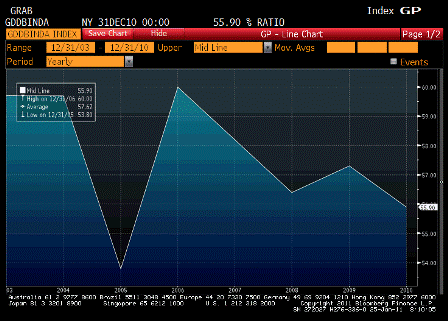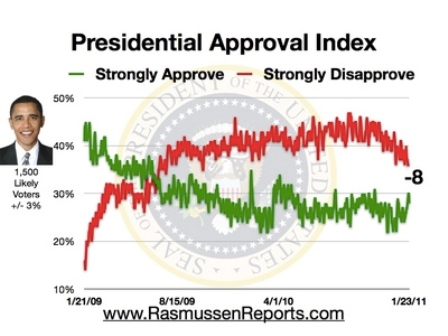So it looks to me like all the major currencies have somewhat strong fundamentals.
That is, policy is working to make them ‘harder to get.’
EU and UK austerity policies are proactively cutting net govt spending from where it was.
And the EU has figured out that the ECB can fund at will entirely without ‘finance’ concerns, gradually removing the perceived chances of catastrophic defaults and the break up of the currency union with each succeeding intervention.
While higher crude prices are making the $US a bit easier to get offshore, interest rate policy, including QE2, is removing dollars from the non govt sectors that would have otherwise been paid out by the US govt, and domestic credit expansion remains anemic, particularly with regards to housing, the traditional source of ‘borrowing to spend.’ And the international stampede out of the dollar due to unwarranted fears of QE2 is still in the process of getting reversed. This flight took a variety of forms, from selling the dollar vs other currencies to buying gold, silver, and other commodities in general.
China is tightening up on state sponsored lending which makes yuan harder to get as they ramp up their politically motivated struggle to fight inflation.
And there are at least some noises that even India and Brazil seem to be at least leaning towards less inflationary policy, though sometimes misguided.
And while Japan has done a bit of fiscal expansion, and a bit of dollar buying, markets are telling us it hasn’t done enough, at least not yet, as the yen remains firm even after more than a decade of a near 0 rate policy.
All the currencies getting strong at the same time with only minor shifts in relative value is also evidenced by a general deflationary bias in the market place.
And, as previously discussed, this is coming after rising commodity prices have had a chance to bring on higher levels of supply.
Low interest rates have also added their positive supply side effects, as inventory is cheap to hold and capacity cheap to bring on line and keep in reserve.
Historically, private sector credit expansion has kicked in as economies recover, replacing the aggregate demand from government deficit spending, as the automatic fiscal stabilizers work to increase tax payments and reduce fiscal transfers for the likes of unemployment compensation.
This time, however, it seems to be different, with govts. taking proactive measures to contain and reduce deficits rather than continuing the govt. deficit spending until the hand off to private sector credit expansion takes over and the automatic fiscal stabilizers kick in.
In other words, for the size govt we have, we remain grossly over taxed as evidenced by the still massive output gap.



